- 24/7 Free Consultation: (888) 424-5757 Tap Here To Call Us
Illinois Youth Residential Treatment Center Sexual Abuse Lawyer
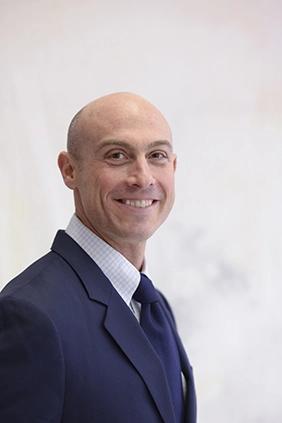
Expert Legal Counsel for Survivors of Abuse in Illinois Juvenile Residential Treatment Facilities
At Rosenfeld Injury Lawyers, we understand the deep impact this kind of trauma can have on children and their families. If your child or a loved one has been sexually abused in a youth residential treatment facility, we’re here to help. Contact us to speak with an Illinois youth residential treatment center sexual abuse lawyer.
For families in Chicago and across Illinois, youth residential treatment facilities are meant to provide care and rehabilitation for vulnerable children. Unfortunately, some of these treatment centers become environments where abuse takes place, causing unimaginable harm instead of healing.
Survivors of sexual abuse in juvenile residential treatment facilties, like Timberline Knolls or Rock River Academy, often face long-lasting physical and emotional scars that may take years to address.
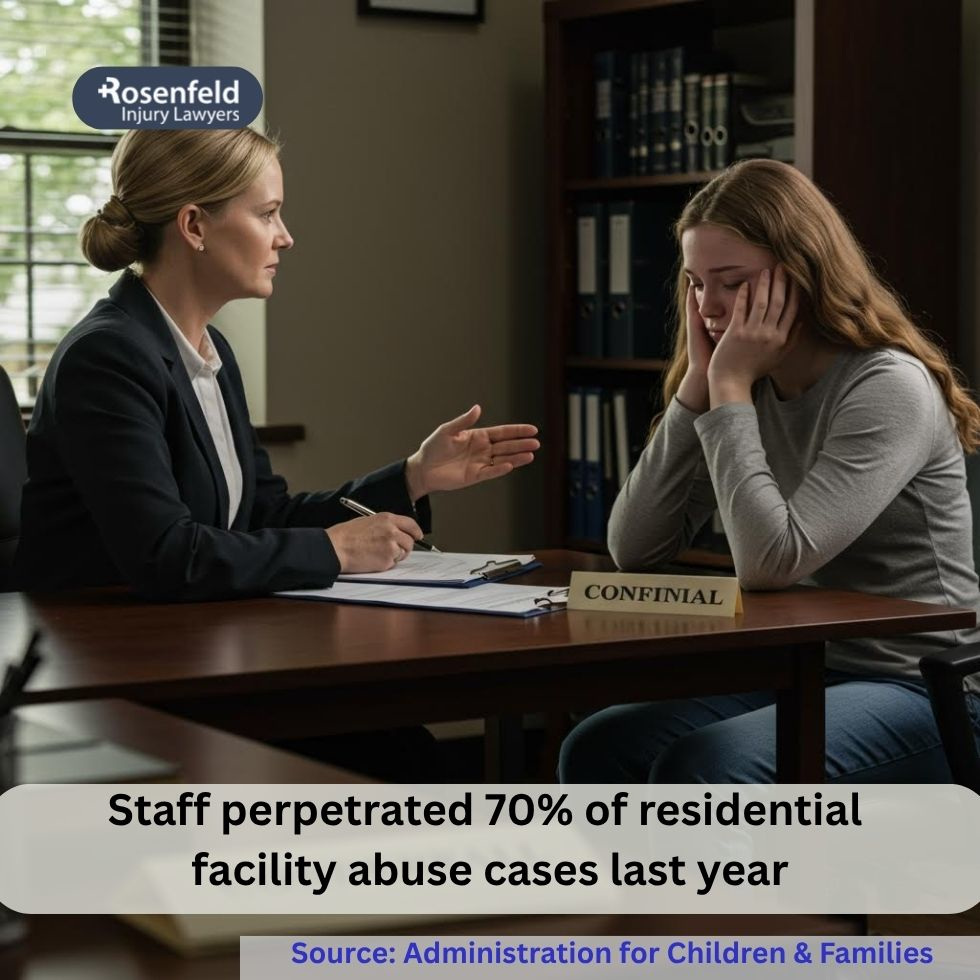
Understanding Illinois Youth Residential Treatment Facilities
Youth residential treatment programs offer safe and structured environments for children and adolescents dealing with complex challenges. These facilities support individuals under 18, with specific age ranges varying by program. They address a variety of needs, including mental health struggles, substance use issues, and behavioral concerns.
Youth residential treatment facilities provide mental health treatment and other care that often includes therapy sessions with licensed professionals. These may involve one-on-one counseling, support groups, and sometimes family services to rebuild connections at home.
Programs may also focus on life skills training or strategies for managing emotions and improving decision-making. The ultimate goal is to help young people heal, grow, and gain the tools they need to move forward in healthy and meaningful ways.
Illinois Juvenile Residential Treatment Facilities & the Issue of For-Profit Management
Several major for-profit operators offer treatment programs for juveniles. Profit-focused strategies can lead to cost-saving measures like failing to hire enough employees or providing minimal training.
When companies don’t provide adequate supervision, crisis response, or security, the likelihood of abuse and neglect grows.
Examples of Issues in For-Profit RTFs in Illinois
The unfortunate reality is that these for-profit residential treatment programs exist all over the country, and Illinois is no different.
Universal Health Services: Universal Health Services operates a number of facilities and has been accused of insufficient staffing, neglect, and improper restraint methods.
Acadia Healthcare: Acadia Healthcare has been accused of focusing on the quantity of patients despite a decline in quality of care. Allegations state that Arcadia unlawfully receives money for each patient who goes there.
These cases highlight the serious shortcomings and widespread abuse that can arise when profit motives overshadow the best interests of the children in Illinois youth residential treatment facilities.
Types of Residential Treatment Centers
Residential treatment centers cater to various needs, each type of facility offering specialized programs. Common examples include:
Substance Abuse Programs
Substance abuse facilities help young people overcome drug or alcohol dependency. Many also deal with co-occurring disorders, treating both substance use and any underlying mental health concerns.
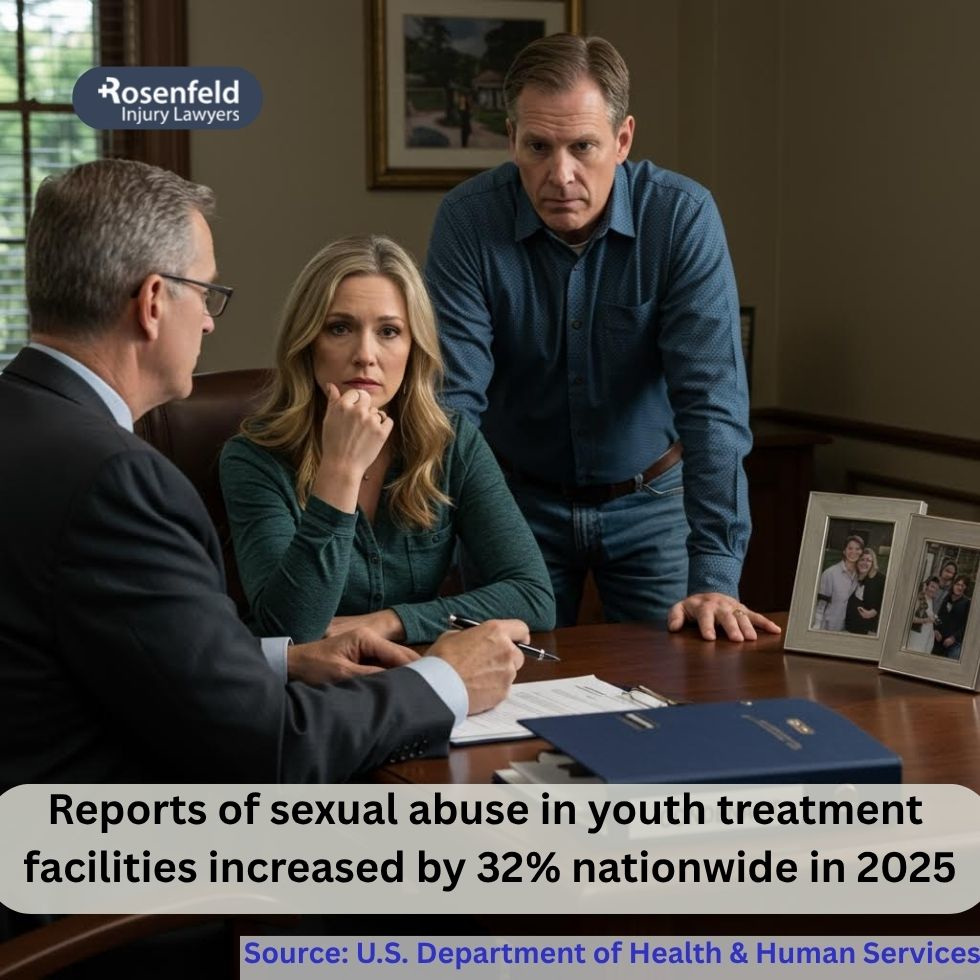
Treatment for Mental Health Challenges
Mental health facilities are for adolescents managing conditions like depression, anxiety, and bipolar disorder. These Illinois youth centers combine therapy with medication management and coping-skill development.
Behavioral Treatment Facilities
The focus here is on addressing issues like conduct disorder or oppositional defiant disorder. Programs include structured activities and therapy to build positive habits, discipline, and responsibility.
Juvenile Facilities
These juvenile justice centers focus on rehabilitation, education, and supervision for youth inmates or at-risk adolescents in a structured environment.
Foster Homes
Children unable to stay with their birth families temporarily live with approved caregivers, receiving support and stability until their home situation is resolved.
Halfway Houses
These facilities offer young people a transition from custody or treatment to more independent living, with rules and guidance to help them adjust.
Camps and Wilderness Camps
Through outdoor activities and adventure-based therapy, kids and teens develop teamwork, self-reliance, and essential life skills in a less traditional setting.
If you have any questions about a legal claim after you or a loved one has been sexually abused at one of these facilities, reach out to our specialized youth residential treatment facility sexual abuse lawyer.
History of Abuse & Lawsuits Filed Against Illinois Youth Residential Treatment Facilities
The history of abuse in Illinois youth residential treatment facilities is, unfortunately, quite extensive. Over the years, investigations have uncovered significant failings that have resulted in abuse, neglect, and even death of vulnerable children in these facilities.
Hartgrove Hospital
Reports have uncovered repeated abuse, both physical and sexual, at Hartgrove Hospital over the past decade. Patients often reported feeling unsafe, underscoring the severity of the situation. In response, Illinois halted new admissions of state wards to the hospital.
There have been numerous lawsuits filed against this facility in Illinois alleging sexual abuse. The facility is still open and operating.
Timberline Knolls
There have been accusations of abusive staff members at Timberline Knolls allegedly sexually assaulting patients. The facility’s delay in responding allegedly exacerbated the emotional distress of victims.
At least 6 lawsuits have been filed against this facility for claims of sexual abuse and assault.
Rock River Academy
There have been lawsuits filed by former residents alleging that United Health Services, the operator of the facility, allowed a culture of abuse to flourish. Allegations indicate staff exploitation of residents, including engaging in sexual conduct in exchange for contraband such as snacks and cigarettes. The facility is closed.
Riveredge Hospital
This facility, also operated by Universal Health Services, faces serious allegations involving sexual abuse and unreported deaths, indicating a troubling lack of accountability and oversight. In addition to countless reports of sexual abuse and other kinds of harm, there have been lawsuits filed against the facility.
Streamwood Behavioral Healthcare System
Reports indicate that staff members at Streamwood Behavioral Healthcare System failed to properly address incidents of physical and sexual abuse between patients, raising questions about safety protocols and supervision.
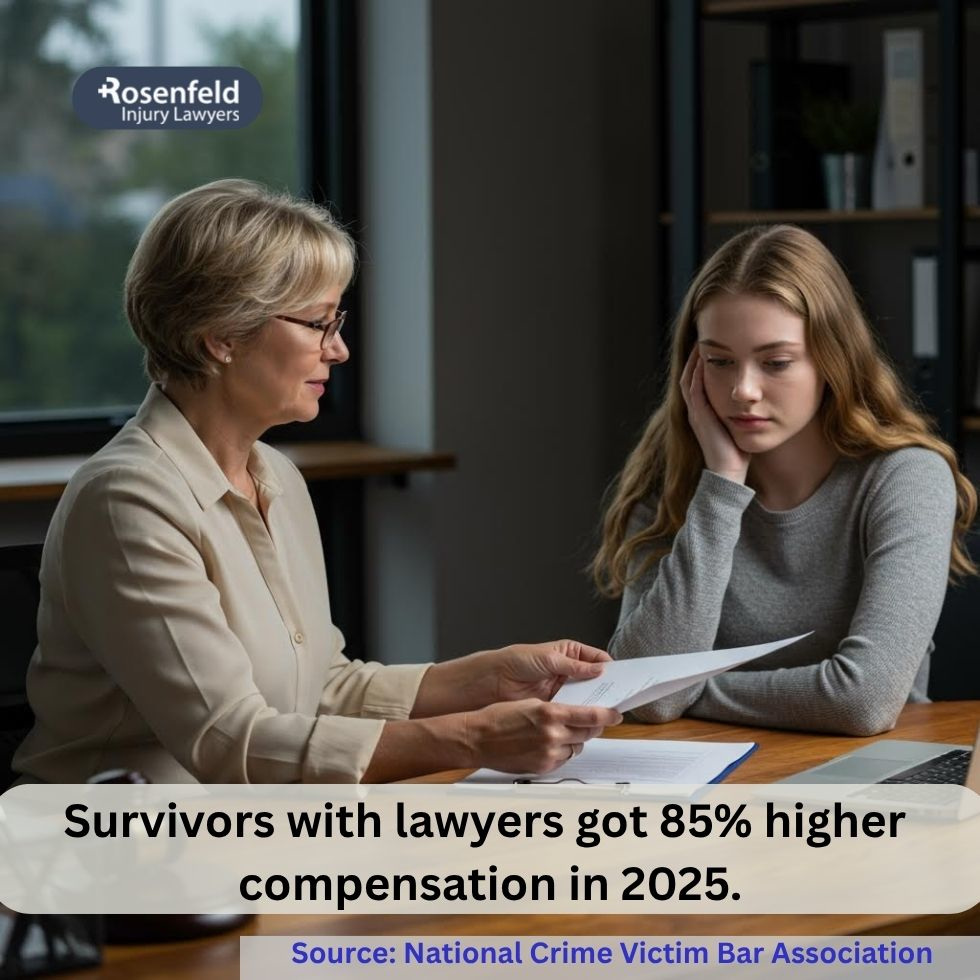
The Pavilion
The Pavilion was found liable in legal proceedings following a 2020 rape incident, revealing systemic management failures. The court ordered the facility to pay $535 million as a result of its negligence.
Lakeshore Hospital
Described in a lawsuit as a “hospital of horrors,” Chicago Lakeshore Hospital faces accusations involving severe abuse of minors, including reports of sedation and physical aggression, allegedly covered up by officials. Sexal abuse lawsuits have been filed on behalf of at least 7 children.
The Daniel F. and Ada L. Rice Child + Family Center
Allegations against The Rice Child + Family Center include inadequate supervision leading to cases of peer-on-peer physical and sexual abuse, as well as failure to implement appropriate therapeutic interventions.
Brightpoint
Recent reports against the facility – which formerly operated as Children’s Home and Aid – suggest systemic failures in monitoring foster placements and addressing complaints of mistreatment.
BCHFS
Following accusations from a resident, a staff member at the Baptist Children’s Home and Family Services of Illinois has faced criminal charges, highlighting serious concerns regarding resident safety. The staff member pled guilty to two criminal charges of criminal sexual assault with a victim aged 13 to 17.
Some other facilities that we see complaints from include:
- Gateway Foundation
- Illinois Recovery Center
- Footprints to Recovery
- Chestnut Health Systems
- SunCloud Health
- Sandstone Care
- A Safe Haven
- Alexian Brothers The Harbor
- Rosecrance
- Lake Behavioral Hospital
If you have been sexually abused and have any question about sexual abuse lawsuits, don’t hesitate to reach out for help with the legal process.
Common Types of Abuse in Youth Treatment Facilities
Youth residential treatment facilities are intended to provide care and rehabilitation for vulnerable youth, but in some instances, abuse occurs, including:
Physical Abuse
Physical abuse occurs when a person causes bodily harm to residents. Staff may use excessive force during discipline or improper restraints, resulting in bruises, injuries, or even death in extreme cases.
Psychological Abuse/Emotional Abuse
Emotional and psychological abuse includes behaviors meant to degrade or intimidate residents. Examples include verbal insults, humiliation, or continuous criticism.
Financial Abuse
Financial abuse involves exploiting a resident’s resources. Staff may misuse a resident’s money, restrict their access to financial accounts, or take advantage of their lack of financial literacy for personal benefit.
Sexual Abuse
Sexual abuse involves non-consensual sexual activity or acts with residents who are too young or vulnerable to give consent. Common types include:
- Coerced sexual acts through intimidation or manipulation
- Unwanted physical contact of a sexual nature – by force
- Sexual grooming, where trust is built to exploit vulnerable residents over time
- Voyeurism or forcing residents to participate in inappropriate sexual displays
Contributing Factors
Some of the contributing factors to sexual abuse in these facilities include:
- Inadequate Oversight: Poor supervision can allow abusive behavior to go unnoticed.
- Staffing Issues: Understaffing or poorly trained staff increases risks.
- Isolation of Residents: Secluded environments limit outlets for victims to seek help.
- Fear of Retaliation: Residents may stay silent out of fear of punishment or being disbelieved.
Efforts must focus on identifying these forms of abuse and addressing the systemic gaps that allow this harm.
Government Actions & Media Coverage
Illinois has seen a surge in high-profile sexual abuse cases involving sexual abuse at youth detention facilities. According to the Associated Press, hundreds of lawsuits have been filed in the state, with numerous survivors coming forward to report staff-perpetrated abuse.
A recent ABC Eyewitness News feature highlighted over 130 victims filing lawsuits alleging misconduct dating back to the 1990s. This brings the number to over 800 adults who say they endured sexual abuse or other harm as children in both state-run and Cook County detention centers. Many of these claims were filed as recently as February 2025.
Congress introduced H.R. 485 – the Stronger Child Abuse Prevention and Treatment Act – which aims to improve resources and protections for children who have experienced sexual abuse.
In Illinois specifically, new measures, such as HB 222, offer further legal safeguards for those pursuing civil action over childhood abuse. These changes include preventing sexual abuse from being blamed on the victim, recognizing sexual abuse as inherently harmful, and removing expectations that survivors should have understood or acknowledged the abuse at the time it took place.
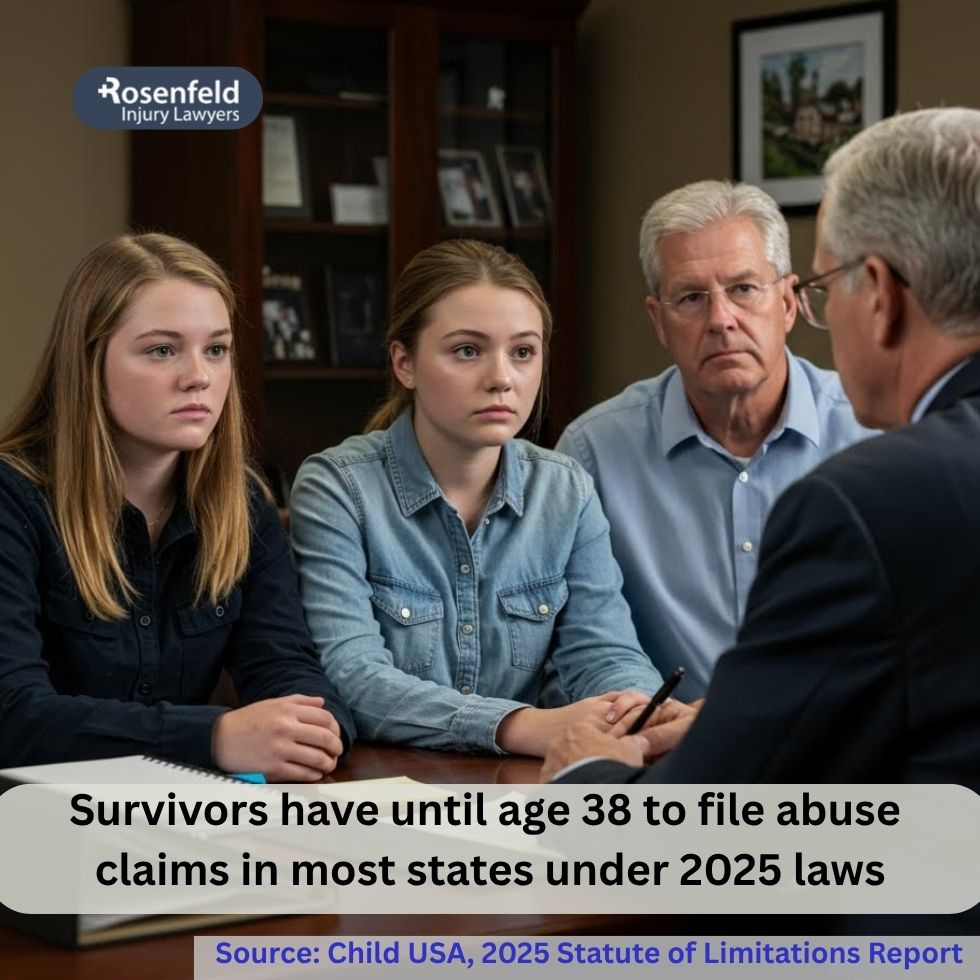
Resources for Sexual Abuse Victims in Illinois
If you or someone you know has been affected by sexual abuse, there are resources available in Illinois:
- The Illinois Coalition Against Sexual Assault (ICASA) offers counseling, advocacy, and a 24-hour crisis hotline to connect victims with local services.
- Rape, Abuse & Incest National Network (RAINN) provides a national hotline and online chat service for confidential help and guidance.
- Chicago Alliance Against Sexual Exploitation (CAASE) provides legal aid, education, and support.
Seeking help is an essential step toward healing. Contact our lawyers specializing in sexual abuse cases for help.
Eligibility to File Civil Lawsuits in Illinois
In Illinois, survivors of abuse may have the right to pursue legal action against those who caused them harm. The Gender Violence Act (740 ILCS 82) enables individuals who have suffered gender-related violence, including sexual assault or abuse, to sue for monetary and punitive damages. Victims can file sexual abuse claims and seek financial compensation for their injuries and hold perpetrators accountable under state law.
Liability for Residential Treatment Facility Sexual Assault and Abuse
Understanding liability in these cases is essential. Below is an overview of who the plaintiffs and defendants may be.
Plaintiffs in Youth Residential Facility Abuse Lawsuits
Individuals or groups filing Illinois sexual abuse lawsuits against youth residential treatment facilities often include:
- Survivors of abuse
- Estates representing survivors, if the sexually abused victim has passed away
- Family members acting on behalf of those harmed
- Former staff members who witnessed the abuse
Defendants in Youth Residential Facility Abuse Lawsuits
Determining who is liable for the abuse can be a little bit more challenging, but it’s possible with the right legal representation. Potential defendants may involve:
- Individual staff members
- Teams of employees
- Facility directors or administrators
- Corporations operating the facilities
- Local, state, or federal authorities
- Outside organizations providing financial support
Reach out to learn more about who may be liable for sexual abuse in these facilities.
Filing a Youth Residential Treatment Facility Abuse Lawsuit in Illinois
Filing a youth residential treatment facility abuse lawsuit in Illinois can involve multiple steps to ensure the responsible parties are held accountable, including:
Initial Confidential Consultation: During this first step, survivors and their families can discuss their situation with a sexual abuse attorney, ask questions, and explore legal options
Initial Investigation: This involves gathering documentation, witness statements, and any official reports that show patterns of abuse or neglect.
Drafting the Complaint: A lawyer will prepare legal papers that outline how the facility, staff, or others caused harm, and why they should be liable under Illinois law.
Negotiations and Discovery: Both parties share evidence with each other, interview witnesses under oath, and explore the possibility of a settlement.
Court Proceedings: If negotiations don’t work out, the case may be taken to trial, where it is presented before a judge or jury.
Rosenfeld Injury Lawyers’ Role
Our lawyers guide survivors through each phase of the legal process, from the first consultation to trial, ensuring they understand their rights at every step. Our team investigates claims thoroughly, consults with experts, and advocates for financial compensation on behalf of those affected by abuse.
Working with an experienced attorney provides personalized support and levels the playing field against powerful institutions and aggressive insurance companies that are trying to avoid a payout.
Statute of Limitations on Civil Lawsuits
Survivors of child sexual abuse in Illinois have the ability to file a lawsuit whenever they’re ready. Illinois law no longer enforces a statute of limitations for sexual abuse cases, allowing victims to seek justice without being restricted by time. This change took effect on January 1, 2014, under Illinois Compiled Statutes Section 735 ILCS 5/13-202.2. This change is not retroactive, so it’s important to reach out to a lawyer to determine what the statute of limitations is for your case.
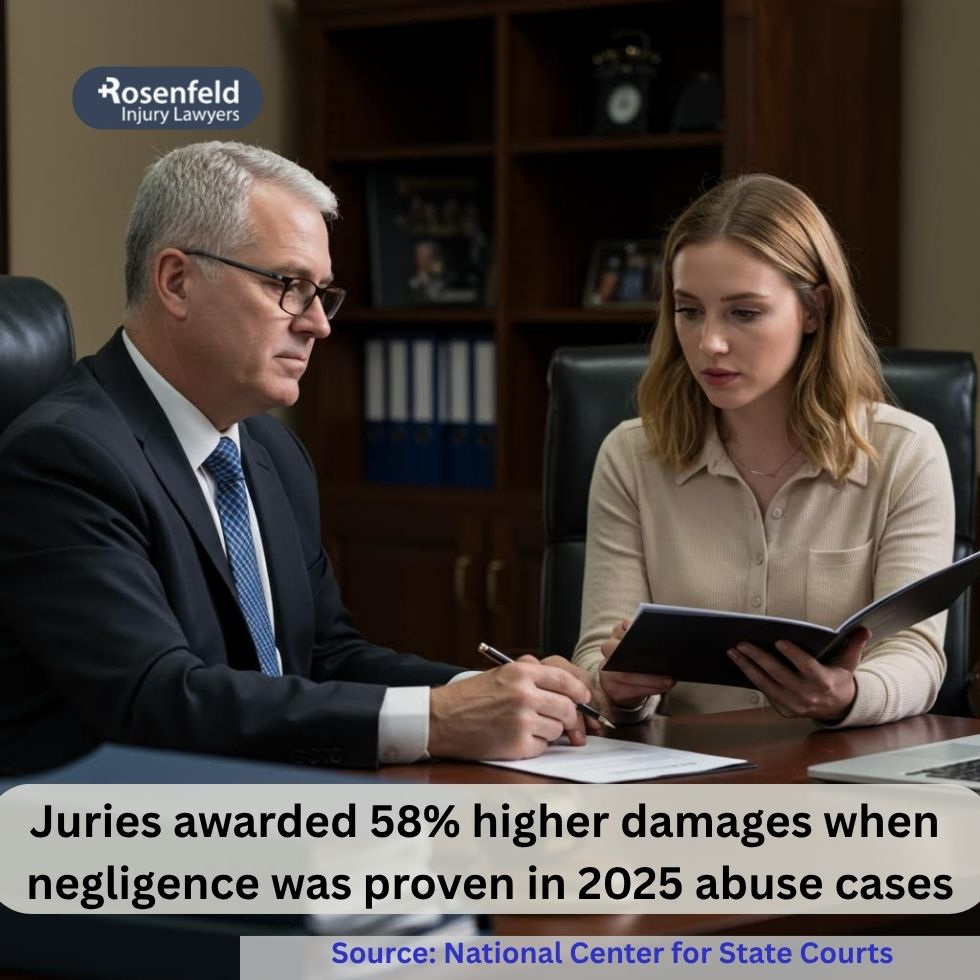
Damages Awarded in Sexual Abuse Lawsuits
When survivors of sexual abuse in youth residential treatment facilities decide to pursue legal action, they may be entitled to various damages through civil lawsuits, including:
- Financial compensation for medical treatment, including therapy and related care
- Reimbursement for income lost due to abuse, such as missed work or reduced earning potential
- Pain and suffering damages for emotional and psychological harm
- Damages for loss of enjoyment of life
- Reimbursement for legal fees and case-related costs
- Punitive damages to hold the perpetrator accountable and deter future misconduct
Securing these damages helps survivors address their immediate needs and the lasting effects of abuse.
Take Legal Action Today!

At Rosenfeld Injury Lawyers, we are committed to providing compassionate and professional support to survivors of abuse in youth residential treatment facilities. We understand that nothing can erase the pain you have endured, but we want to help you seek justice and hold those responsible accountable.
Our firm offers clients confidential and free consultations, allowing you to discuss your case with our sexual abuse lawyers without any financial obligation. We work on a contingency fee basis, meaning you pay no fees unless we recover compensation for you. Call or complete our online contact form to discuss your case with an experienced Chicago personal injury attorney.
All content undergoes thorough legal review by experienced attorneys, including Jonathan Rosenfeld. With 25 years of experience in personal injury law and over 100 years of combined legal expertise within our team, we ensure that every article is legally accurate, compliant, and reflects current legal standards.







